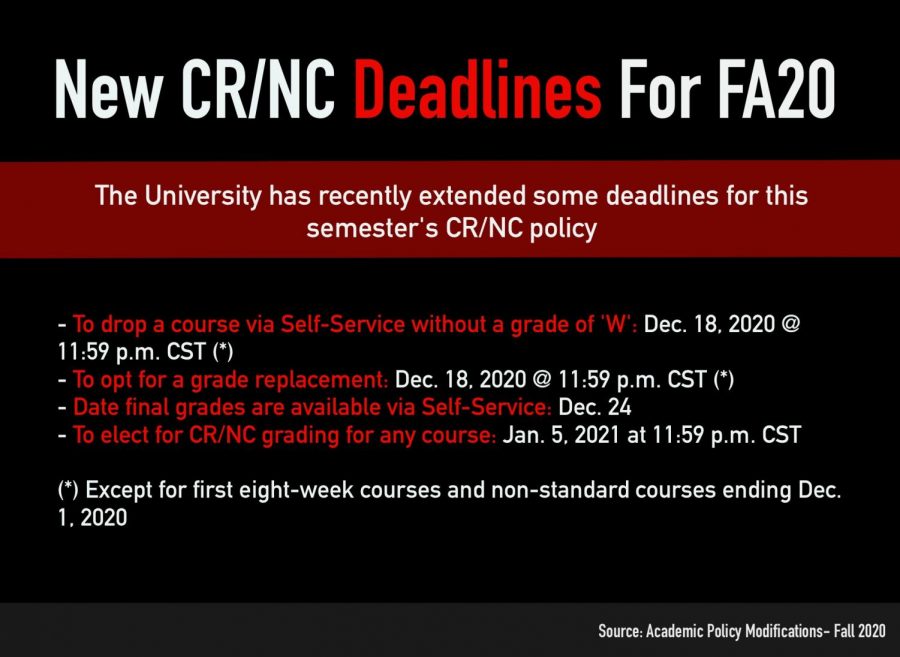UI imposes credit/no credit policy after administration expresses time, technology concerns
December 8, 2020
On Nov. 20, the University Senate voted to adopt a credit/no credit (CR/NR) policy for this fall semester, allowing students to elect for CR/NR grading for their courses.
This decision came after a months-long student push for a CR/NC option due to the ongoing COVID-19 pandemic, which culminated in a petition signed by thousands calling on the University to adopt a CR/NC policy.
The original proposal before the University Senate called for a new “No Record COVID” grade category, but the University Senate amended this to a full CR/NC policy similar to that of last spring.
While under the original proposal students receiving grades of D- to D+ could choose to opt into “No Record COVID” and still receive credit for a course, this is not the case under the current CR/NC policy.
In the wake of the University Senate’s decision, University officials have voiced concerns over the potential side-effects of implementing full CR/NC instead of the original “No Record COVID” policy this semester.
Get The Daily Illini in your inbox!
Dr. Kevin Pitts, the vice provost for undergraduate education, noted the original “No Record COVID” proposal would have been a largely automated process, where software would automatically replace grades of F or below with “No Record COVID.”
Under the current CR/NC policy, students will have to request the CR/NC grade mode through their home college for each course, requiring University staff to process each request.
“The college has to process (the request) and then it has to be passed to the registrar, and the registrar has to process it,” Pitts said.
During the University Senate meeting discussing CR/NC, Meghan Hazen, the University registrar, told University senators that the University could not implement a CR/NC policy “without it pretty dramatically affecting (the University’s) other end of term processes.”
One of these end-of-semester tasks is making sure students receiving federal financial aid, such as Pell grants, receive their aid for the spring semester and remain eligible for it.
While Pitts believes the University will be able to provide students with their spring financial aid in time, he expresses concerns over the U.S. Department of Education’s calculation of students’ “satisfactory academic progress” requirement for financial aid.
“If students have too many no-credit (courses), then that could put their financial aid award in jeopardy,” Pitts said. “We’ll be trying to do what we can to make sure it’s not a problem, but expanded CR/NC potential exacerbates that.”
Pitts also noted that delays in grade processing may affect students who will be attending other institutions next semester such as community colleges, which tend to start their semesters earlier.
Additionally, Pitts expressed worry over how quickly the University will be able to formally certify the degrees of students graduating in December, who will need certified degrees to apply for jobs or graduate school.
“No one of these things is a showstopper,” Pitts said. “These are all issues that we’re very worried about. We’re going to do our absolute best to minimize the effects of all of them.”
Pitts credits the student-led push as being a significant factor in the University’s decision to consider a CR/NC policy. While University officials discussed many potential academic policy modifications since before the semester began, the University initially decided not to implement any changes.
“Back then, our decision was to not have any academic policy modifications,” Pitts said. “It really was the voice of the students that drove this.”
Kushal Amilineni, senior in Engineering and one of the authors of the CR/NC petition, is pleased with the University Senate’s decision to adopt a full CR/NC policy albeit so late into the semester.
He stated that while the original proposal for “No Record COVID” was a step in the right direction, it would not have been enough, as it did not adequately address students who obtain grades of C or higher.
“Most of the people are worried about the C’s,” he said. “The people in the D’s and F’s usually retake the class anyway; they grade-replace it.”
An active user of the social media platform Reddit, Amilineni began to notice how students’ mental health have been affected by the pandemic on r/UIUC, a forum on Reddit dedicated to University-related discussion.
“Over time, I could just very palpably feel how mental health has been deteriorating through the (Reddit posts) themselves,” he said.
Amilineni also said he advocated for giving students more time to decide whether to opt for CR/NC and set the opt-in deadline for CR/NC until after final exams.
Pitts confirmed that the University is indeed implementing these changes this semester. He added that the many students who opted for CR/NC grading last spring ended up asking the University to undo it after they received their final grades.
“(Last semester), there were literally tens of thousands of requests for CR/NC,” Pitts said. “Then at the end of the semester, students came back and half of them asked us to undo it.”
As a result, the University extended the deadline to elect for CR/NC this semester to Jan. 5, so students who do better than expected in a class will not have to request the University rescind CR/NC, according to Pitts.
Amilineni hopes that in the future, the University will implement academic policy modifications such as CR/NC more quickly instead of making a decision last-minute.
Pitts stated that the University is planning to make a formal decision regarding policies such as CR/NC much earlier next semester, further noting that the University hopes to discuss potential spring policy modifications during a University Senate meeting in early February.
Amilineni notes that the ongoing pandemic can affect students differently, recalling a time where he and several other students spoke about their experiences to the University Senate.
“Not a single one of us had the same story,” he said. “I personally spoke about how my city had floods recently, and my internet situation was very bad for a whole month.”







